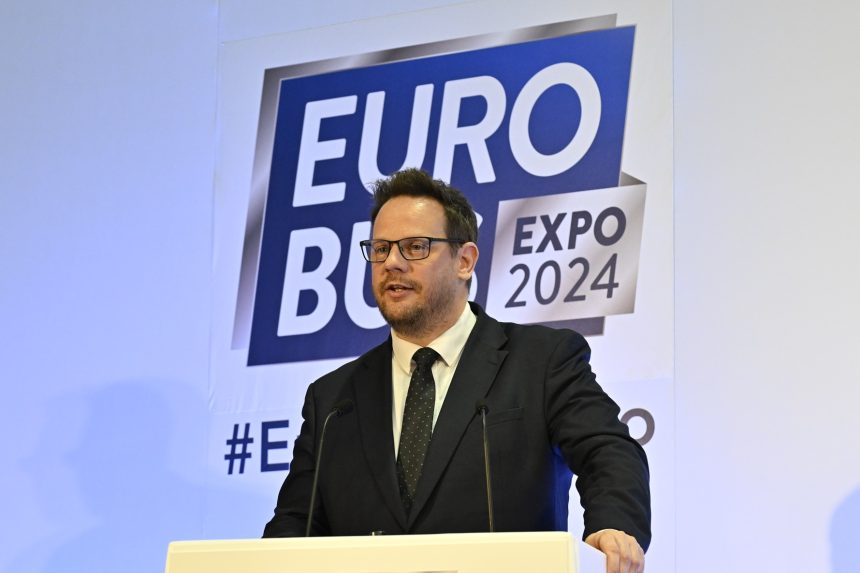Multiple bus franchising models are being explored by the government as part of work to reform service delivery in England, Under-Secretary of State for Transport Simon Lightwood told a full house of industry members during a keynote address at Euro Bus Expo at the NEC Birmingham on 14 November.
That is preceding introduction of the Buses Bill, which is expected soon. The Bill will define changes to how the sector in England works. Mr Lightwood also highlighted the importance of lifting the ban on creation of new municipal bus operators and underlined previous comments made to routeone that partnerships have a part to play in the future landscape.
While the Bee Network in Greater Manchester is seen by the government as the gold standard of how bus franchising can work well, the minister adds that “we are looking at models of franchising that can suit all areas.” Rural locations are among those, he says.
In an exchange where Mr Lightwood revealed that his father was previously a bus driver for South Shields Busways – now part of Stagecoach North East – he told show attendees that the Labour government “recognises the potential of buses and coaches.”
In that vein, the minister notes that events including Euro Bus Expo “are so important,” with the biennial gathering in Birmingham allowing the industry to share “our insight and ideas, our experiences, and our expertise – and our questions and concerns.”
His words focused on the bus sector, but in an echo of comments made by Secretary of State for Transport Louise Haigh to the Transport Committee a day earlier, Mr Lightwood says that ministers “have got ambitious plans to improve services and grow passenger numbers.”
The Buses Bill will give local leaders the necessary tools “to overcome local challenges,” he adds.
In a precursor of a subsequent announcement around simplification of bus service funding, that will see the removal of “barriers and bureaucracy” to allow better services. In a hint of what may follow for BSOG under reform of that funding stream, the minister says that local authorities and local leaders will gain “greater flexibility and control over funding.”
Such a tactic will help them “to plan for the long-term,” adds Mr Lightwood. “Ditching the sticking plaster solutions in favour of sustainable solutions and protecting local networks.”
He also hinted that further government funding will be forthcoming for the purchase of zero-emission buses. Mr Lightwood – who notes the UK’s leadership of Europe in electric bus rollout – says that that Westminster will work with operators “to maximise the benefits of this transition,” building on the Zero Emission Bus Regional Areas programme.
The recently announced UK Bus Manufacturing Expert Panel was also touched upon by Mr Lightwood. Further details are still to be announced, but he says that the Panel’s formation “will support local authorities to deliver on their transport ambitions, accelerate the net-zero transition, and keep Britain at the forefront of bus manufacturing.”



























